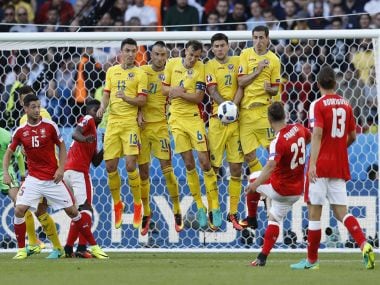Two matches in and the pre-tournament suspicions can now be confirmed: Switzerland’s “golden generation”, as the current squad is often called, is desperately short of a finisher. There will be no miraculous turnaround in the pitiful form of forward Haris Seferovic while the highly-rated 19-year-old Breel Embolo, on evidence of his brief second-half cameo against Romania, isn’t cut out to make an impact on the international stage just yet. It is this long-standing weakness of the Swiss team that continues to hurt them on the pitch. With no end to the problem in sight – the squad having limited alternatives – it will most likely prove to be decisive in their pursuit of glory. [caption id=“attachment_2837606” align=“alignleft” width=“380”]  Switzerland’s Xherdan Shaqiri takes a freekick. Reuters[/caption] For now, though, by earning a come-from-behind 1-1 draw against Romania in Paris via Admir Mehmedi’s sweetly-struck volley, the Swiss have virtually booked their passage to the knockout rounds – which will be their first appearance beyond the group stage at a European Championship. In that sense, they are on the brink of making history. However, you can’t help but feel underwhelmed by their display. Coach Vladimir Petkovic’s side had been fortunate to come away with an opening-game win against minnows Albania, who played nearly an hour with 10 men. Goalkeeper Yann Sommer had bailed them out then. On Wednesday, the Swiss were worthy of a point but nothing more – and against another inferior opponent in Romania, that is a matter of great concern. Problems again stemmed from the lack of a cutting edge upfront. Seferovic, who missed several chances against Albania, continued in the same vein. First, he wriggled away smartly from his marker Vlad Chiriches on the edge of the box but shot narrowly wide. Then, later in the first half, he had the goal at his mercy but shot tamely into the hands of the goalkeeper. The 24-year-old forward had endured a torrid 2015-16 season at German Bundesliga club Eintracht Frankfurt, scoring only three times in 32 appearances, while he added only three goals in a two-year long Euro 2016 qualifying campaign. It was hoped that scoring a goal or two could spark an upsurge in form. That goal hasn’t come yet while chances have gone begging. At least he has linked up well with his teammates to find space, which is scant consolation for a striker who’ll be judged only on his scoring feats. Embolo, who replaced Seferovic midway through the second half, wasted a clear-cut opportunity as well, when he headed skipper Stephen Lichtsteiner’s cross wide of goal. He was a more physical and troublesome presence for the Romanian defence to deal with but his decision-making was often questionable – it was littered with aimless enthusiasm of youth. He did, however, add a greater sense of purpose on the pitch but there was precious little in terms of output. The 19-year-old, who has made a name for himself at Swiss champions FC Basel, is hailed as the country’s next big talent. In January earlier this year, FC Basel had in fact rejected a €27million offer for him from Germany’s VFL Wolfsburg. But it remains to be seen whether his brief appearance convinced Petkovic to grant him more game time in upcoming matches. When your forwards aren’t scoring, it builds pressure on the rest of the team. Goals from midfield become a necessity rather than a bonus, turning players into nervous shooters. Defenders feel the pressure too, since without the comfort of goals at the other end, one mistake from them becomes potentially decisive. Indeed Lichtsteiner’s silly tug of the shirt gifted Romania a penalty and a goal – one of the few clear chances they had all game. Switzerland have scored only twice in two matches at Euro 2016. Goals scored by a defender and a forward-turned-winger. Both goals have resulted from corner-kicks, which has been their most profitable source. During qualifying, nearly one-third of Swiss goals arrived from corners. But Petkovic’s side need to do more from open play. Performance of the Swiss midfield was impressive but not spectacular. Arsenal-bound Granit Xhaka, officially awarded the ‘Man of the Match’ award for the second straight game, once again dictated the tempo with over a century of passes but he lacked a much-needed creative edge to his game. Playmaker-winger Xherdan Shaqiri, the most famous face of the team, failed to live up to his potential yet again. Valon Behrami, meanwhile, put in a stellar defensive shift while Blerim Dzemaili had another lively game supporting the centre-forward. Full-backs Lichtsteiner, who had a disappointing game by his high standards, and Ricardo Rodriguez provided plenty of width in attack with their team comfortably dominating possession. Switzerland, however, do not appear to be a cohesive unit on the pitch. Prior to the match, Shaqiri’s comments suggesting he will consider playing for Kosovo, one of FIFA’s newest member nations, were poorly timed. It hasn’t set well with him that he was ignored for Swiss captaincy (and vice-captaincy, for that matter) but by placing his own interests over his team’s, in the middle of a major tournament, he has shown why he isn’t captain material. On the pitch, Shaqiri hasn’t inspired his team yet. You certainly expect more from a player nicknamed ‘The Alpine Messi’. Shaqiri was the top-scorer in qualifying with four goals. And for Switzerland to stand any chance of progressing deep into the tournament, it is up to players like him to compensate for a painful lack of potency in the striking department.
Two matches in and the pre-tournament suspicions can now be confirmed: the “golden generation” of Switzerland, as the current squad is often called, is desperately short of a finisher.
Advertisement
End of Article


)

)
)
)
)
)
)
)
)



